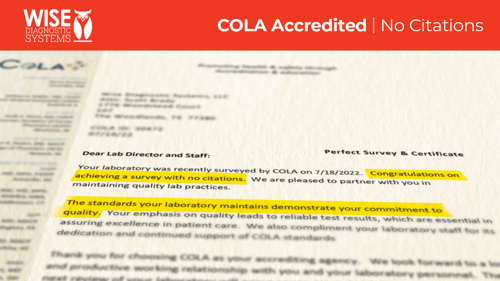

What is a CLIA Approved Lab?
For many Americans, the accuracy of clinical laboratory tests can be a life-or-death matter, which is why it is important that more than 250,000 labs across the country are CLIA-certified.
CLIA is an acronym for the Clinical Laboratory Improvement Amendments (CLIA) of 1988, which requires any facility performing examinations of human specimens (e.g., tissue, blood, urine, etc.) for diagnosis, prevention, or treatment purposes to be certified by the Secretary of the Department of Health and Human Services.
“The objective of the CLIA program is to ensure quality laboratory testing,” says the Centers for Medicare and Medicaid Services (CMS).
CLIA regulations apply to laboratory testing in all settings including commercial, hospital, and physician office laboratories.
Among the tests commonly performed in laboratories regulated under CLIA are tests on blood, urine and other samples to detect cancer, HIV, diabetes, and multiple other diseases.
CLIA and the Medicare and Medicaid Programs
The Omnibus Budget Reconciliation Act of 1989 requires that laboratories participating in the Medicare program comply with CLIA requirements.
Therefore, virtually all laboratories in Texas must obtain a CLIA certificate to operate and be eligible for payment under Medicare and Medicaid,” says Texas Health and Human Services.
It is important to understand that CLIA standards are national and are not Medicare-exclusive. CLIA applies to all providers rendering clinical laboratory services, whether or not Medicare claims are filed.
Improving American Lives by Improving Test Results
The Medicare Learning Network guide to CLIA says the regulations were put in place to establish “quality standards for laboratories to ensure the accuracy, reliability, and timeliness of patient test results regardless of where the test is performed.”
Data indicates that in the first 25 years of the legislation, the total number of quality deficiencies decreased approximately 40 percent from the first laboratory survey, with similar findings demonstrated in the review of proficiency testing (PT) data over time.
Improved testing is not trivial when it comes to improving the health outcomes of Americans.
“If glucose tests are not performed correctly, a patient could receive an incorrect insulin dose and sustain potentially dangerous consequences. If your cholesterol is high and the laboratory results are reported as normal, you may not receive the care necessary to prevent a heart attack,” says CMS.
The genesis for CLIA came in the wake of reports of inaccurate results from Pap smears intended to detect cervical cancer.
CLIA Levels of Complexity: Waived, Moderate, High
CLIA regulations are based on the complexity of test methods with three levels recognized:
- Waived Complexity
- Moderate Complexity, including Provider-Performed Microscopy Procedures (PPMP)
- High Complexity
“The more complicated the test, the more stringent the requirements,” says the Medicare Learning Network. “CLIA specifies quality standards for PT, facility administration, general laboratory systems, preanalytic, analytic, and postanalytic systems, personnel qualifications and responsibilities, quality control, quality assessment, and specific cytology provisions for laboratories performing moderate and/or high complexity tests.”
Waived tests, according to CLIA, are those tests that are determined by the CDC or FDA to be so simple that there is little risk of error. Examples of waived tests include:
- Glucose test
- Cholesterol test
- Pregnancy test
- Some urine tests
There are two states (New York and Washington) that are exempt under CLIA because of their state licensure programs.
Five Types of CLIA Certification
For those laboratories that enroll in the CLIA program, there are five types of certifications available:
- Certificate of Waiver (COW): Issued to a laboratory that performs only waived tests. Routine on-site surveys are not required for this certificate unless there is a complaint, but the laboratory must follow the manufacturer’s instructions for test performance
- Certificate for Provider-Performed Microscopy Procedures (PPMP): Issued to a laboratory in which a physician, midlevel practitioner or dentist performs specific microscopy procedures during a patient’s visit. A limited list of provider-performed microscopy procedures is included under this certificate type, which are categorized as moderate complexity testing. This certificate permits the laboratory to also perform waived tests. Routine on-site surveys are not required for a PPMP Certificate, but these laboratories are subject to moderate complexity requirements and can be surveyed as part of a routine survey for nonwaived tests or a complaint is alleged.
- Certificate of Registration (COR): Issued to a laboratory to allow the laboratory to conduct nonwaived (moderate and/or high complexity) testing until the laboratory is surveyed (inspected) to determine its compliance with the CLIA regulations. Only laboratories applying for a certificate of compliance, or a certificate of accreditation will receive a certificate of registration.
- Certificate of Compliance (COC): Issued to a laboratory once the State Agency or CMS surveyors conduct a survey (inspection) and determine that the laboratory is compliant with the applicable CLIA requirements. This type of certificate is issued to a laboratory that performs nonwaived (moderate and/or high complexity) testing.
- Certificate of Accreditation (COA): Issued to a laboratory based on the laboratory’s accreditation by an accreditation organization approved by CMS. This type of certificate is issued to a laboratory that performs nonwaived (moderate and/or high complexity) testing.
Laboratories may be accredited by the following programs:- American Association of Blood Banks (AABB)
- American Association for Laboratory Accreditation (A2LA)
- Accreditation Commission for Health Care, Inc (ACHC)
- American Society of Histocompatibility and Immunogenetics (ASHI)
- Commission on Office Laboratory Accreditation (COLA)
- College of American Pathologists (CAP)
- Joint Commission for the Accreditation of Healthcare Organizations
Wise Diagnostics Systems is an accredited laboratory under COLA, the only laboratory accreditation provider that operates its accreditation program in accordance with a quality management system certified to ISO 9001:2015.
Contact Wise DX today to find out more about how we can provide nursing homes, long-term care facilities, gastroenterologists, and infectious diseases specialists with accurate, expedited, and innovative molecular testing using PCR technology.
Subscribe to email updates
Related Articles

Topics

Topics

Topics



